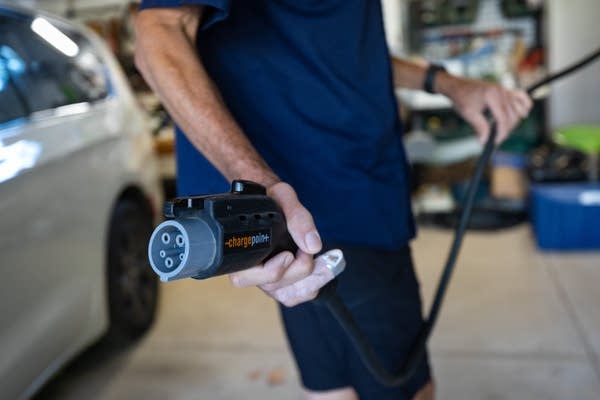A U-turn on EVs? Minnesota lawmakers could be headed that direction in session finale

Go Deeper.
Create an account or log in to save stories.
Like this?
Thanks for liking this story! We have added it to a list of your favorite stories.
Cornerstone Auto Group president and CEO Rob Powell has a collection of dealerships in the Twin Cities and only a handful of new electric vehicles out of its 500 cars on sales lots.
That’s partly due to ordering and partly due to what General Motors allocates. Powell said “they allocate a number of their models to us in proportion with what they think will sell in this market.”
But he added, “There’s just not as many of them as there probably should be, or used to be.”
Lawmakers in St. Paul and Washington D.C. have worked to juice sales in recent years by offering purchase and lease incentives for electric vehicle purchases — reaching into the thousands of dollars. But this year, they might be throwing things into neutral or reverse by slimming funds for charging infrastructure in the case of the federal government and tacking on surcharges at the state level.
Turn Up Your Support
MPR News helps you turn down the noise and build shared understanding. Turn up your support for this public resource and keep trusted journalism accessible to all.
Legislation that passed in the Minnesota House and Senate — and is being merged into a single transportation bill in the final week — would assess a $200 per year surcharge for all-electric models and $100 for hybrids. Depending on the final wording, the surcharge could be automatically boosted in years to come.
The proposed surcharge is designed to recoup money that isn’t feeding into the state’s road-building account through gas taxes.

As of January 2024, there were more than 53,000 registered EVs in Minnesota. Another 16,000 were sold last year, according to data tracking group Atlas Public Policy.
“We’re coming off of Minnesota having its Electric Vehicle Rebate Program, which was very popular, but only funded for one year and now we’re kind of seeing the state go in the opposite direction,” said Carolyn Berninger with Drive Electric Minnesota.
That rebate program offered up to $2,500 for new EVs and $600 for purchases of used ones. That was on top of tax credits three times as large on the federal level.
Even with that, Berninger points out EV adoption in Minnesota is still very low. Berninger is concerned customers won’t want to go with an EV when they see that annual surcharge triple from $75 to $200.
“Hiking up fees, and particularly this $200 fee, would require electric vehicle owners to pay more in the electric vehicle fee than a lot of gas car owners pay through the gas tax,” Berninger said.
Hybrid and electric motorcycles would be assessed from $20 to $40 annually.
Berninger said disincentives are especially mounting at the federal level. The White House wants to cancel funding for the $5 billion EV charging station grant program that was approved by Congress in the 2021 infrastructure bill and signed into law by former President Joe Biden.
Minnesota Attorney General Keith Ellison, a Democrat, is part of a multi-state coalition suing the Trump administration over the move.
“The thing that’s happening in the Legislature, I disagree with, but I can’t claim it’s unconstitutional,” Ellison said. “What the president is doing is unconstitutional and illegal, and that’s why we’re suing them for it.”

At the Capitol in St. Paul, state lawmakers have versions of the surcharge bill in both the House and Senate. Defenders say they don’t think it’ll dampen purchase preferences.
“I don’t think anyone goes to the dealership and says ‘I was going to buy an electric vehicle, but that extra $75 a year, that was what got me,’” said Rep. Bjorn Olson, R-Fairmont. “I don’t think anyone says that.”
The House is tied among Republicans and Democrats this year. As the final days of session wind down, some Democratic representatives are frustrated that more is not being done to address climate change.
“Climate doesn’t give us a pause. The climate doesn’t care about our politics,” said Rep. Larry Kraft, DFL-St. Louis Park. “The fact that we weren’t able to make more progress, yes, I’m very disappointed, and I have renewed emphasis to work on it, and I wish that my colleagues on the Republican side of the aisle would recognize physics.”


